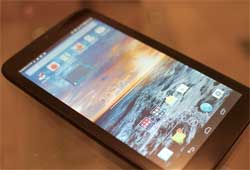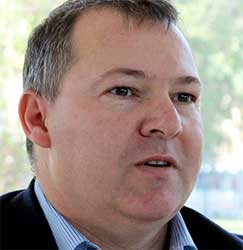
Top stories






More news



ESG & Sustainability
#Sona2026: President announces crisis committee to tackle SA's water challenges












According to Vodacom, its features, however, are comparable with the top brands, including the iPad to the Samsung Galaxy Tab.
This is the second low-cost device offered by the mobile operator, which launched the Smart Kicka smartphone in August and sold 250,000 units in the first month. MTN, the second-largest network operator in the country, launched its low-cost Steppa costing R500 earlier this year.
But the savvy tablet plan for Vodacom is to boost revenue from data by drawing more data customers into its network.
Targeting indigenous-language speakers is part of the grand plan to convert customers from monthly users to people who buy data on a daily basis.
According to Phil Patel, Vodacom's Chief Commercial Officer, 17m people use Vodacom's data service - fully justifying the R9bn investment it is making to improve its network this year. And Vodacom is prioritising rural areas and townships.
Pitching to indigenous-language markets may be a clever move. Vodacom ran "focus groups" which showed that many South Africans whose first language is not English preferred services provided in their mother tongue.

"People feel comfortable in languages other than English. While people can understand English, they may not trust it," Patel said.
The company plans to add Afrikaans - the third most spoken language after Zulu and Xhosa, according to the 2011 national census - to the tablet's language abilities in future.
Patel said the device was "a channel" to sell other services. Vodacom could also package the education syllabus digitally on the tablet as a next step.
The tablet, which has a 7-inch screen, operates on Android's KitKat operating system, providing a familiar interface and applications for consumers. It weighs 275g and has front and back cameras for pictures and videos. It also has Bluetooth and Wi-Fi. It is available for outright purchase or at R59 a month on a 24-month contract. The packages come with a data allocation.
Davide Tacchino, Vodacom's Managing Executive for terminals, said Vodacom would negotiate with manufacturers in China to lower tablet prices.
He says Vodacom will initially release about 20,000 of these tablets but aims to sell 100,000 during the first year.
"We'd like to enlarge the [tablet] market [in South Africa] by between 30% and 40%," he added.
By the end of June last year, more than 1.4m tablets had been sold, compared with sales of 960,000 units by the end of 2012, according to World Wide Worx.
Gareth Mellon, Team Leader for ICT at Frost & Sullivan Africa, said low-cost devices were popular for their preloaded functions, rather than the device foror instance, having high-demand applications such as Facebook and WhatsApp.
Mellon said demand for MTN's Steppa smartphone was high but added tht MTN didn't have the manufacturing capability to meet the demand. "There have also been some question marks over the phone's functionality," Mellon said.
Source: Business Times via I-Net Bridge